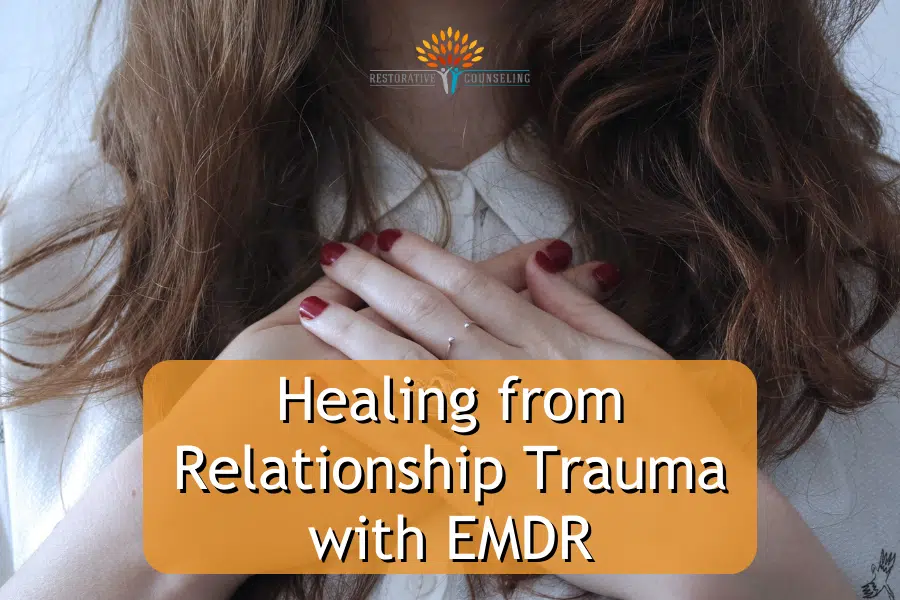Written by Jordan Meehan, LCSW
Relationships have the power to bring immense joy and fulfillment into peoples’ lives. However, they can also become a source of deep emotional pain and trauma. When people experience relationship trauma, it can leave lasting scars that affect one’s well-being and ability to form healthy connections. In such cases, Eye Movement Desensitization and Reprocessing Therapy (EMDR) can play a significant role in facilitating healing from relationship trauma and help individuals regain their emotional well-being.
Understanding Relationship Trauma:
Relationship trauma encompasses a range of experiences that can profoundly affect individuals’ emotional well-being and interpersonal interactions. It is essential to gain a deeper understanding of the complexities and impacts of relationship trauma to fully appreciate the role EMDR plays in facilitating healing.
First, relationship trauma can manifest in different forms, including emotional, verbal, physical, or sexual abuse, infidelity, abandonment, or neglect. These experiences can be deeply distressing and can shake an individual’s core sense of safety, trust, and self-worth. These emotional wounds are often long-lasting, impacting an individual’s mental, emotional, and even physical health.
Moreover, relationship trauma can have far-reaching effects beyond the specific relationship in which it occurred. Individuals who have experienced trauma may find it challenging to form new attachments and establish healthy relationships. Trust issues, fear of vulnerability, and difficulties with intimacy can arise as a result of previous relational wounds. Trauma can create patterns of interaction that prevent individuals from experiencing fulfilling and secure connections.
Also, relationship trauma can significantly impact an individual’s self-perception and self-esteem. Survivors may internalize negative beliefs about themselves, feel unworthy, unlovable, or responsible for the traumatic experiences. These negative self-perceptions can undermine their ability to establish boundaries, assert their needs, and engage in self-care.
Overcome the pain brought on by relationship trauma.
EMDR’s targeted approach to processing traumatic memories and addressing associated negative beliefs and emotions offers hope and empowerment to survivors of relationship trauma, guiding them on a path towards healing and the possibility of healthier, more fulfilling relationships.
The Role of EMDR in Healing:
EMDR is an evidence-based therapeutic approach that focuses on reprocessing traumatic memories to promote healing. The treatment approach recognizes that traumatic experiences can become stored in the brain in an unprocessed manner, leading to distressing symptoms and an individual feeling “stuck.” EMDR utilizes bilateral stimulation, such as eye movements or alternating shoulder taps, to facilitate the reprocessing of traumatic memories.
1. Rewriting the Narrative:
One of the primary objectives of EMDR in healing relationship trauma is to help individuals reframe their experiences and rewrite the negative narratives that they may have internalized. By revisiting the traumatic memories in a safe and controlled environment, guided by a trained therapist, individuals can gain a new perspective and change distorted beliefs about themselves and relationships. As a result, EMDR enables them to reconstruct a healthier narrative that promotes self-compassion, empowerment, and resilience.
2. Processing Unresolved Emotions:
Unresolved emotions from relationship trauma can manifest as intense fear, anger, guilt, shame, or sadness. EMDR facilitates the processing of these emotions by allowing individuals to access and express them in a safe therapeutic space. Through bilateral stimulation, individuals can release trapped emotions, reduce their intensity, and develop healthier emotion regulation capabilities. This process creates a pathway for emotional healing and a renewed sense of emotional well-being.
3. Restoring Trust and Safety after Experiencing Relationship Trauma:
One of the significant impacts of relationship trauma is the erosion of trust and the feeling of being unsafe in future relationships. EMDR addresses this by helping individuals identify and reprocess the negative beliefs and fears associated with trust and safety. Through EMDR’s integration of positive experiences and resources, individuals can rebuild a sense of trust in themselves and others, paving the way for healthier and more fulfilling connections.
4. Enhancing Self-Compassion and Self-Worth:
In addition to affecting trust, relationship trauma sometimes leaves individuals feeling unworthy, unlovable, or responsible for their traumatic experiences. EMDR promotes healing by assisting individuals in developing self-compassion and challenging negative beliefs about themselves. Thus, individuals can reprocess the memories that reinforce their negative self-perceptions, allowing them to cultivate a more positive and compassionate view of themselves.
5. Strengthening Boundaries and Communication:
Lastly, trauma from a relationship can disrupt a person’s ability to establish and maintain healthy boundaries in future relationships. However, EMDR helps individuals explore and reprocess experiences that compromised their boundaries, empowering them to set clear limits and assert their needs in the future. Additionally, EMDR, in combination with other therapies, can address communication challenges that arose from the trauma, enhancing individuals’ ability to express themselves effectively and establish open, honest, and respectful communication within relationships.
Healing from relationship trauma is a complex and deeply personal journey. EMDR offers a powerful therapeutic approach to facilitate healing and restore emotional well-being. By addressing the underlying traumatic memories, EMDR helps individuals rewrite their narratives, process unresolved emotions, restore trust and safety, enhance self-compassion and self-worth, and strengthen boundaries and communication skills.
Restorative Counseling can support you in healing from relationship trauma.
If you have experienced relationship trauma, you do not have to remain emotionally trapped by your past experiences any longer. EMDR empowers you to heal, grow, and forge healthier relationships in the future. Remember, healing is possible, and you deserve to experience the love and connection you desire. Contact us today to schedule an appointment.

Hi, I’m Jordan!
I partner with teens and adults to treat concerns related to trauma, anxiety, and relationships utilizing CBT, ACT, and EMDR approaches. Read more about me.
Follow Restorative Counseling
Sign up for our newsletter

